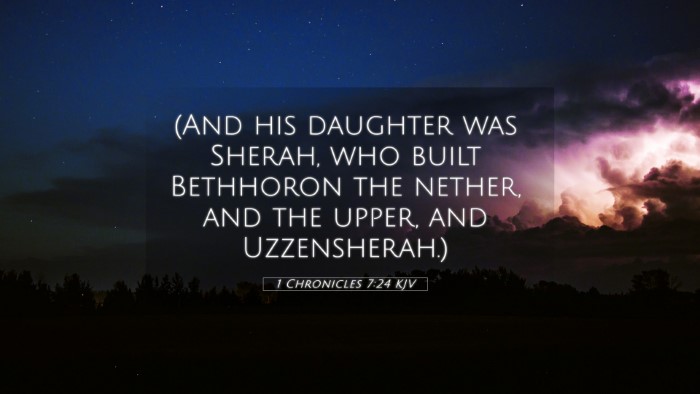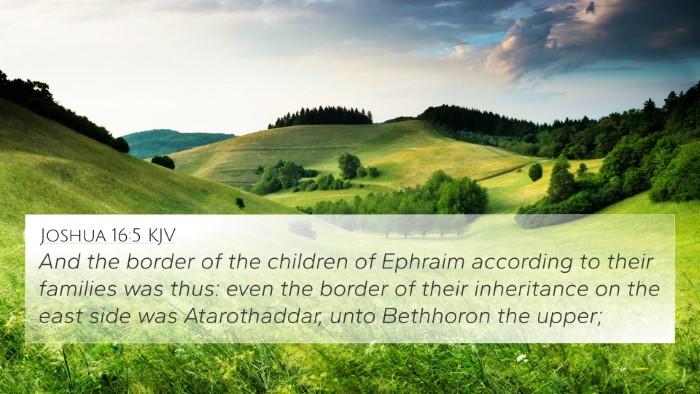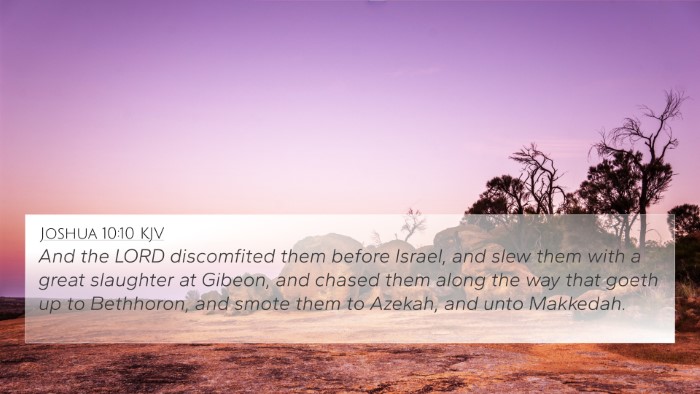Understanding 1 Chronicles 7:24
Verse: 1 Chronicles 7:24 - "And his son was Sheerah, who built both Lower and Upper Bethhoron, and the families of Ahijjah and of Sheerah their sister."
Meaning and Insights
This verse is situated within a genealogical context, detailing the descendants of Ephraim, one of the tribes of Israel. The focus is on Sheerah, a notable figure in the lineage who is credited with the construction of two towns: Lower and Upper Bethhoron.
- Significance of Names: The names mentioned, Sheerah and the places, signify the importance of heritage and the impact individuals can have through their contributions.
- Role of Women: Notably, Sheerah being a female figure in a genealogy highlights the often-overlooked roles of women in God's plan, reflecting their ability to exert influence.
- Historical Context: The towns of Bethhoron were strategically important, serving as vital locations during the Israelites' conquest of Canaan, thus symbolizing progress and establishment in the Promised Land.
Commentary Insights
Matthew Henry:
Matthew Henry emphasizes the importance of genealogies in Scripture, noting that they serve to connect personal histories with the broader narrative of Israel. He comments on the strength and capability of Sheerah in building cities, implicitly urging the reader to recognize the significance of diligence and purpose in fulfilling one's responsibilities.
Albert Barnes:
Albert Barnes remarks on the construction of the cities by Sheerah, interpreting it as an act of leadership and foresight. He points out that the naming of these places should inspire believers to understand that the works of our hands, whether big or small, are vital in the kingdom of God.
Adam Clarke:
Adam Clarke provides an analysis of the geographical and historical implications of Bethhoron. He connects the verse to broader themes of divine guidance and fortitude, symbolizing the realization of God’s promises through active faith and enterprise.
Cross-References and Related Verses
This verse can be connected with several Biblical texts that highlight the themes of legacy, construction, and divine providence:
- Joshua 10:10-11: God's intervention in battle shows His support for those who act in faith to occupy the land.
- 1 Chronicles 4:23: Another reference that discusses descendants and their impact on history.
- Nehemiah 3:7: The rebuilding efforts during Nehemiah's time resonate with Sheerah's establishment of cities.
- Judges 1:12-13: Discusses the tribe of Ephraim's role in occupying land, connecting with Sheerah's lineage.
- Psalm 127:1: Reflects the necessity of God’s blessing in any human endeavor, similar to Sheerah's work.
- 1 Peter 2:5: Alludes to believers being built into a spiritual house, paralleling Sheerah’s act of building cities.
- Philippians 1:6: Encouraging the notion that God continues His work in believers, akin to the legacy established by Sheerah.
Thematic Connections
Not only does 1 Chronicles 7:24 offer insights into individual legacy, but it also creates thematic connections across the Bible. Key themes include:
- Legacy and Heritage: The Bible often emphasizes the importance of family and personal legacy, as seen throughout Scripture.
- Women in the Bible: Sheerah's mention underscores God’s recognition of women’s pivotal roles in the community and history.
- Construction and Establishment: The act of building in a Biblical context represents faithfulness and obedience to God’s calling.
Conclusion
1 Chronicles 7:24 serves as a powerful reminder of individual contributions to God’s overarching plan, the importance of legacy, and the significance of construction both physically and spiritually. Readers are encouraged to reflect on their roles in building the kingdom of God and the impact of their work, following the example of Sheerah and her family.







